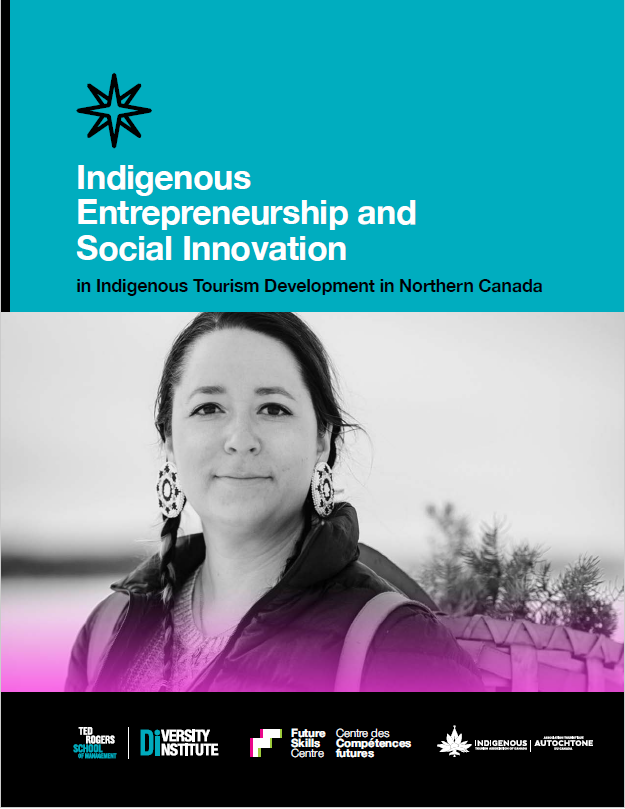Indigenous Entrepreneurship and Social Innovation in Indigenous Tourism Development in Northern Canada

In the spring of 2022, the Indigenous Tourism Association of Canada (ITAC), in collaboration with the Diversity Institute at Toronto Metropolitan University, invited Indigenous women entrepreneurs in Canada’s northernmost communities to participate in the Northern WE in Tourism study. This study sought to identify Northern Indigenous women’s challenges in accessing the skills and resources needed to build sustainable livelihoods in tourism and co-create recommendations to support and stimulate social innovation within the tourism industry in Northern Canada.
This study synthesizes the challenges and successes of Indigenous women in search of sustainable livelihoods related to tourism in the North. The overarching objective is to collaborate and co-create knowledge with First Nations, Inuit and Métis women entrepreneurs in Canada’s North.
The long-term well-being of Indigenous communities in the North requires the integration of Indigenous worldviews into Western systems and business models to advance the cultural alignment of economic development. Building bridges and identifying gateways to economic self-sufficiency, innovation and tourism development grounded in traditional knowledge and values will increase the well-being of Indigenous women entrepreneurs in tourism in the North.
This study uses the Two-Eyed Seeing approach, an Indigenist pedagogy that seeks common ground by drawing on the strengths of Indigenous and Western knowledge systems to streamline access to the right training and resources for Indigenous women entrepreneurs at all stages of tourism business development. The researchers conducted in-depth interviews with Indigenous women entrepreneurs in the region and the organizations that serve them. Quantitative research was collected through two surveys.
Findings
Systemic issues experienced by Indigenous women entrepreneurs in the North, such as discrimination, loss of culture, lateral violence, intergenerational trauma, and stress and mental health issues, affect the ability to maintain a business. The impact of intersectionality, such as being a woman, a caregiver and Indigenous, negatively affects the socioeconomic status of Indigenous women entrepreneurs in the North.
Due to the North’s remoteness, there are limited services available to assist in business development. Indigenous women need opportunities that are not online and not in locations that require travel and overnight stays. The study discusses challenges with conducting business in the North, such as the need for reliable Internet and the cost of shipping.
The study identifies challenges of mastering the skills required to run a successful business in Canada. Women participants identified the need for financial literacy training in schools and free courses that provide entrepreneurs with the skills they need. There is a need for marketing and social media skills to run a business in the North, related to developing an authentic product, as well as pricing it properly and sharing their stories. Indigenous tourism businesses in the North are complex and need flexibility to respond to seasonal infrastructure deficits, as well as new and emerging challenges in the tourism sector. Limited support in completing “actionable” business plans leads to frustration caused by failed grant applications and loan requests.
This study identifies the need for culturally appropriate training led by Indigenous people. Participants cited the importance of having training programs that respond to their specific needs and recognize the realities of the North. Coordinated and flexible access to wraparound supports was identified as necessary. This includes affordable child and elder care on an as-needed basis, access to quality food, health care services and affordable housing to facilitate equitable participation in programs.
Access to Indigenous women mentors with firsthand experience and expertise in tourism helps Indigenous women in the North enrich their hard and social-emotional business skills. Participants in the study identified the need to learn from elders, knowledge keepers, aunties and other community members to succeed. Supportive networks that allow women the flexibility to access and receive support when needed are critical in developing culturally safe and responsive ecosystems that build confidence.
Conclusions and Recommendations
The recommendations in the report have been co-created by researchers and research participants to identify the necessary elements for skills-based programming and business development.
Invest in capacity building
Significant capital investment in capacity-building initiatives within and across Northern communities must have Indigenous oversight. This study identifies bottlenecks and barriers to access preventing Indigenous women from participating in Western business and skill development models. Specifically, there is a need to synchronize services within a streamlined ecosystem that is aligned with Indigenous women’s identity.
Empower Indigenous women
Indigenous women entrepreneurs in the North are frustrated, believing their needs and opinions are neither respected nor validated by the organizations assigned or funded to serve them. Confidence-building activities and investment in the development of soft skills will help women address these frustrations. It is essential to nurture a culture of support that honours Indigenous ways of knowing, learning and sharing knowledge by adopting Two-Eyed Seeing.
Oversight of entrepreneurial knowledge and training through a hub-and-spoke model
Invest in supporting in-person, in-community training. Acknowledge that there is a place for online learning by developing hybrid models in Northern Indigenous communities to ensure the transfer of culture and knowledge with on-the-ground support as needed. Ensure that Indigenous-serving organizations employ a dedicated Indigenous person familiar with the culture of the community they serve and who speaks or understands the language to assist in training and skills development and alignment.
This report was only produced in English.
Read More